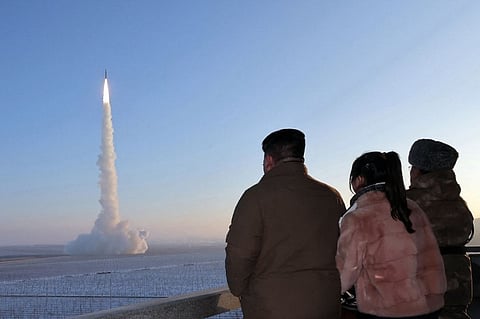
- NEWS
- the EDIT
- COMMENTARY
- BUSINESS
- LIFE
- SHOW
- ACTION
- GLOBAL GOALS
- SNAPS
- DYARYO TIRADA
- MORE

North Korea plans to launch three more spy satellites in 2024 as part of efforts to ramp up its military, state media reported Sunday.
Pyongyang successfully put a spy satellite into orbit last month and has since claimed it was providing images of major US and South Korean military sites.
This year it also conducted a record-breaking number of weapons tests, including the launch this month of its most powerful intercontinental ballistic missile (ICBM), blaming growing threats from the United States.
"The task of launching three additional reconnaissance satellites in 2024 was declared" as one of the key policy decisions for next year at a year-end party meeting, the official Korean Central News Agency (KCNA) said.
The five-day meeting, which ended Saturday, was attended by North Korean leader Kim Jong Un.
"The United States, which has long caused and worsened political instability on the Korean peninsula, continues to pose various types of military threat to our country even as the year is coming to an end," Kim said.
Seoul, Tokyo and Washington have ramped up defence cooperation in the face of growing missile and nuclear threats from Pyongyang this year and recently activated a system to share real-time data on North Korean missile launches.
Earlier this month, a US nuclear-powered submarine arrived in the South Korean port city of Busan, and Washington flew its long-range bombers in drills with Seoul and Tokyo.
The North has previously described the deployment of Washington's strategic weapons — such as B-52 bombers — in joint drills on the Korean peninsula as the "intentional nuclear war provocative moves".
Kim ordered his country's Korean People's Army to closely monitor the security situation on the peninsula and to "always respond with an overwhelming attitude".
"We must respond quickly to a possible nuclear crisis and continue to accelerate preparations to pacify the entire territory of South Korea by mobilising all physical means and forces, including nuclear force, in case of emergency," he said.
At the meeting, Kim said he would no longer seek reconciliation and reunification with South Korea, noting the "persisting uncontrollable crisis situation" which he said was triggered by Seoul and Washington.
Inter-Korean relations have deteriorated to a low point this year, with Pyongyang's spy satellite launch prompting Seoul to partially suspend a 2018 military agreement aimed at defusing tensions on the peninsula.
"I believe that it is a mistake that we should no longer make to consider the people who declare us as the 'main enemy'… as a counterpart for reconciliation and unification," KCNA cited Kim as saying.
Kim ordered the drawing-up of measures for reorganising departments handling cross-border affairs, to "fundamentally shift the direction".
Pyongyang declared itself an "irreversible" nuclear power last year and has repeatedly said it will never give up its nukes programme, which the regime views as essential for its survival.
The United Nations Security Council has adopted many resolutions calling on North Korea to halt its nuclear and ballistic missile programmes since it first conducted a nuclear test in 2006.
